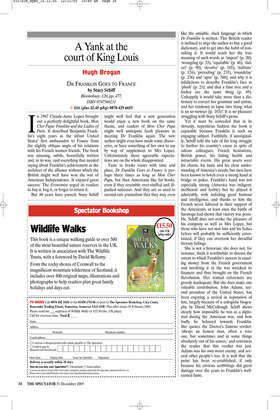A Yank at the court of King Louis
Hugh Brogan
DR FRANKLIN GOES TO FRANCE by Stacy Schiff Bloomsbury, £20, pp. 477, ISBN 0747569231 ✆ £16 (plus £2.45 p&p) 0870 429 6655 In 1967 Claude-Anne Lopez brought out a perfectly delightful book, Mon Cher Papa: Franklin and the Ladies of Paris. It described Benjamin Franklin’s eight years as the infant United States’ first ambassador to France from the slightly oblique angle of his relations with his French women friends. The book was amusing, subtle, beautifully written and, in its way, said everything that needed saying about Franklin’s achievement as the architect of the alliance without which the British might well have won the war of American Independence. It enjoyed great success: The Economist urged its readers to buy it, beg it, or forget to return it.
But 40 years have passed; Stacy Schiff might well feel that a new generation would enjoy a new book on the same theme, and readers of Mon Cher Papa might well anticipate fresh pleasure in meeting Dr Franklin again. The new author might even have made some discoveries, or have something of her own to say by way of supplement to Mrs Lopez. Unfortunately these agreeable expectations are on the whole disappointed.
Taste in books varies with time and place. Dr Franklin Goes to France is perhaps three times as long as Mon Cher Papa, but then Americans like fat books, even if they resemble over-stuffed and illpacked suitcases. And they are so used to second-rate journalism that they may even like the amiable, slack language in which Dr Franklin is written. This British reader is inclined to urge the author to buy a good dictionary, and to get into the habit of consulting it. It would teach her the true meaning of such words as ‘import’ (p. 20), ‘wrangling (p. 33), ‘equitable’ (p. 46), ‘dulcet’ (p. 90), ‘devolve’ (p. 105), ‘militate’ (p. 124), ‘prevailing’ (p. 235), ‘roundelay’ (p. 236) and ‘apse’ (p. 388); and why it is infelicitous to describe Franklin’s face as ‘plush’ (p. 21); and that a lime tree and a linden are the same thing (p. 49). Unhappily it would take more than a dictionary to correct her grammar and syntax, and her tendency to lapse into slang; what is an ur-wowser (p. 183)? It is no pleasure struggling with Stacy Schiff’s prose.
Yet it must be conceded that in its slovenly, repetitious fashion the book is enjoyable because Franklin is such an engaging subject. Faithfully, if unoriginally, Schiff tells the tale of his long struggle to further his country’s cause in spite of odious colleagues, French hesitations, British power, his failing health and intractable events. His great assets were his charm, his fame and his clear understanding of America’s needs; but men have been known to botch even a strong hand at bridge or poker. Franklin’s hand was not especially strong (America was indigent, inefficient and feeble) but he played it admirably, with unfailing good humour and intelligence, and thanks to him the French never faltered in their support of the Americans, at least once the battle of Saratoga had shown that victory was possible. Schiff does not evoke the pleasure of his company as well as Mrs Lopez, but those who have not met him and his ladies before will probably be sufficiently entertained, if they can overlook her dreadful literary failings.
She is not a historian; she does not, for instance, think it worthwhile to discuss the extent to which Franklin’s success in exacting money from the French government and involving it in the war wrecked its finances and thus brought on the French Revolution. Her textual references are grossly inadequate. But she does make one valuable contribution. John Adams, second president of the United States, has been enjoying a revival in reputation of late, largely because of a eulogistic biography by David McCullough. Schiff shows clearly how impossible he was as a diplomat during the American war, and how badly he behaved towards Franklin. She quotes the Doctor’s famous verdict: ‘always an honest man, often a wise one, but sometimes and in some things absolutely out of his senses,’ and convinces the reader that this verdict was just. Adams was his own worst enemy, and several other people’s too. It is well that the point has been re-established, if only because his envious scribblings did great damage over the years to Franklin’s wellearned fame.

















































 Previous page
Previous page